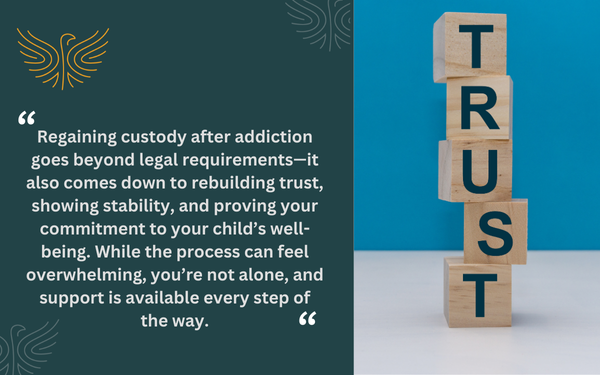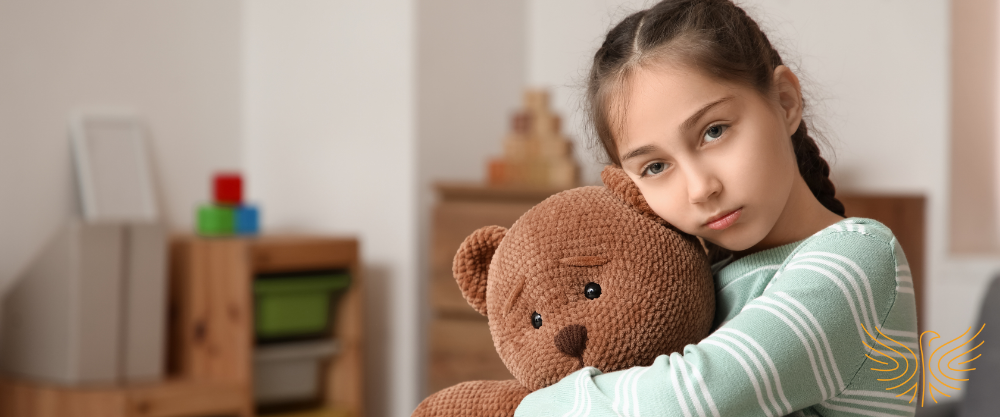About one in four children in the United States lives with a parent or caregiver who has faced a substance use disorder. It can be heartbreaking to know your struggles may have affected not only your relationship with your child but also their emotional and mental well-being.
But completing treatment and committing to recovery are powerful steps that show your dedication to creating a healthier future.
Regaining custody after addiction goes beyond legal requirements—it also comes down to rebuilding trust, showing stability, and proving your commitment to your child’s well-being. While the process can feel overwhelming, you’re not alone, and support is available every step of the way.

In this article, we take a closer look at the child custody process after addiction, including what courts consider, practical steps you can take, and how to strengthen your case as you rebuild your life and your relationship with your child.
_______________________________________________________
How Addiction Impacts Child Custody
When courts make custody decisions, their top priority is always the best interests of the child. This means judges carefully assess which parent can provide a safe, stable, and supportive environment. While substance use doesn’t automatically result in losing custody, it can play a significant role in the court’s decision-making process.
The different forms of custody include:
- Legal Custody: This refers to the right to make important decisions about a child’s upbringing, including education, medical care, and other legal matters.
- Physical Custody: This type of custody determines where the child primarily lives and who is responsible for day-to-day care.
- Joint Custody: In this case, parents share responsibilities. In other words, joint legal custody means both parents are involved in major decisions, while joint physical custody allows the child to spend significant time with each parent.
- Sole Custody: With sole custody, one parent has full decision-making authority, full physical custody, or both. In some cases, a parent may retain legal rights while the child primarily lives with the other parent.
Sometimes, custody arrangements combine these forms—for example, one parent may have sole physical custody while both share legal custody.
How Substance Use Can Affect Custody
Substance misuse can impact custody outcomes because courts prioritize child safety and well-being over everything else. If a parent’s alcohol or drug use affects their ability to care for the child or creates an unsafe environment, judges may limit custody or order supervised visitation.
As such, courts may consider:
- Concerns about a child’s safety, emotional health, and stability
- Evidence of substance-related incidents, such as arrests or hospital visits
- Ongoing issues that interfere with meeting parental responsibilities
- Whether the parent is actively seeking treatment and recovery support
In 2021 alone, more than 80,000 children were removed from their homes due to substance-use-related concerns. However, this doesn’t always mean custody is permanently lost. Many families are reunited after parents complete treatment and demonstrate a stable recovery.
In fact, judges often work alongside child welfare professionals and treatment programs to create pathways for parents to regain custody when possible.
_______________________________________________________
Can a Parent Recovering From Substance Use Get Custody?
Yes, in many cases, parents who are in recovery can regain custody of their children. Courts understand that addiction is a treatable condition, and they recognize that recovery involves hard work, personal growth, and a commitment to creating a safe environment for the child.
While the process isn’t always simple or straightforward, parents who demonstrate progress and stability often have a strong chance of reuniting with their children.
Some factors that may strengthen your case include:
- Completing your treatment program and following any recommendations from your care team.
- Documenting your recovery journey. Attendance at therapy, progress reports, and letters from counsellors can help demonstrate stability.
- Building a strong support network, including family, sponsors, and professionals who can speak to your growth.
- Prioritizing your child’s well-being. Focus on showing how your environment and routines meet their emotional and physical needs.
Ultimately, the courts want to see that you are committed to long-term change and prepared to create a safe, nurturing space for your child to thrive. With the proper support and evidence of progress, regaining custody after addiction is entirely possible!
_______________________________________________________
How Rehab Works and How Long Recovery Takes
For many parents, completing a treatment program is one of the most important steps toward regaining custody. Rehab provides a structured, supportive environment where you can focus on healing, rebuilding healthy habits, and addressing the underlying causes of substance use.
Treatment programs vary, but most combine a mix of medical care, counseling, education, and relapse prevention strategies. You’ll work with professionals who understand addiction and recovery, and who can help you develop the skills needed to create a safe, stable life for yourself and your child.
The length of rehab depends on several factors, including the severity of the addiction, your health, and your personal goals. Common options include:
- Detox programs, which typically last between three and 10 days, and focus on safely managing withdrawal symptoms.
- Inpatient or residential treatment, which are usually 30, 60, or 90 days, offering round-the-clock care and intensive therapy.
- Outpatient programs, which can range from a few weeks to several months, allowing you to live at home while attending scheduled therapy sessions.
Completing treatment and showing a commitment to continued recovery can significantly strengthen your case in custody proceedings. Courts often view successful rehab participation as a positive sign of stability, responsibility, and readiness to provide a safe home for your child.
Taking the first step toward recovery can feel overwhelming, but you don’t have to do it alone. Entering a rehab program not only supports your healing—it can also strengthen your chance of rebuilding trust, regaining custody, and creating a safe, loving environment for your child.
If you’re ready to take that step, our team at Freedom Recovery Centers (FRC) is here to guide you every step of the way. Call us at 804-635-3746 or fill out our online form to learn more about our programs and how we can help you start a healthier, brighter future for you and your family.
.svg)






.svg)

.svg)



.svg)
